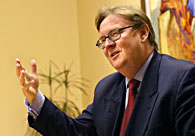New Dean of Education: inclusive learning
New Dean of Education: inclusive learning McGill University
User Tools (skip):
New Dean of Education: inclusive learning
It can't have been the weather that lured McGill's new Dean of the Faculty of Education here. Roger Slee gave up considerably warmer climes when he left his native Australia, where he was head of both the Faculty of Education and the Graduate School of Education at the University of Western Australia. He'd been on leave the past couple of years to be the deputy director-general of education at the Queensland Ministry of Education, where he oversaw the strategic policy for professional development and curriculum for the state's 40,000-strong educational workforce.

Roger Slee, Dean of the Faculty of Education
Owen Egan
He settled into his McGill office January 17, during a cold spell that saw temperatures in the -30s. "The weather is an extreme shock. When I left Brisbane it was 38° C," Slee says. He now juggles strategic scarf wrapping with fogging up his glasses.
Startling weather aside, Slee is delighted with the opportunity to come to McGill. "I immediately knew the name McGill. It has currency," he says of the call inviting him to apply. When he was head of the Department of Educational Studies at Goldsmiths College, University of London (1995–97), Slee relished being in another country, seeing how universities worked there and immersing himself in a multicultural community.
Much of Slee's research has been on identity politics and disability studies. He's the founding editor of The International Journal for Inclusive Education.
"Inclusive education is, simply put, ensuring that education is available for all," Slee says. "The job is to identify the barriers to access, participation and success. Many of those have to do with different kinds of cultural oppression and disadvantages." Slee first became interested in educational equity and justice as a school teacher. "It seemed to me that kids who were getting suspended tended to be kids who were working class, or aboriginal, from minority groups. This was not an issue of individual pathology, but reflected the way in which education articulates cultural relationships and cultural divisions."
The kids who were disruptive or resistant were increasingly being dealt with in special education. This segregation didn't sit well with Slee. "People ought to be educated together. That's what society is: it's made up of difference. [Anthropologist and education specialist] Jules Henry, years ago, described segregated education as an education in social stupidity."
At the same time, Slee sees the benefit of programs, such as the black Saturday morning schools in London, for Caribbean children. "Kids of that cultural identity could get together, and through the celebration of their culture — its history, its language, traditions — they actually got a strong sense of identity and solidarity. The Eurocentric school was simply whitewashing that," he says. "But the issue is choice. Who makes decisions about who goes where, and what [they study]?"
As for McGill, Slee says, "What I think is really important in this job is making sure we confront properly issues around First Nations and aboriginal, indigenous education."
Slee believes it's important for a dean to be open to a range of different sets of questions and possibilities. "A faculty like Education brings together a whole bunch of different disciplines and views, and the struggle between them is important. I would encourage that rather than stick to creating conformity."
He looks forward to getting to know the faculty and its strengths, and how McGill deals with education, disability, gender and sexual politics.
The arrival of a new dean is a ripe opportunity for the faculty to reflect on who they are and what direction they'll take, he says, which complements the university's current planning process. Slee is struck by how McGill is encouraging faculties to think collectively about new research areas and how to work together.
"Universities are becoming borderless institutions. McGill is and must be a world university. It's really important for a faculty to be connected with institutions around the world to offer different possibilities for students." Slee envisions more links with universities in England and Asia, particularly Nanyang University in Singapore, where they're doing second-generation research on productive and critical pedagogies and multi-literacy education. As well, he will host an international colloquium in inclusive education this year, and has asked his Journal co-editor about co-sponsoring a series of conferences on the subject.
He hopes that government will take seriously what universities have to offer. "I see the role of academia as a critical voice and to ask questions about the way things are done and research agendas that are put into practice in schools."
Education is fundamental to "how you see the world, and how you encounter and encourage difference. How you apply principles of equity and justice," Slee says.
"The purpose is not simply to interpret the world-view, but change it. And education is that bridge into different possibilities. It's where you ask very basic research questions: what's going on, how come and what are we going to do about it?"
